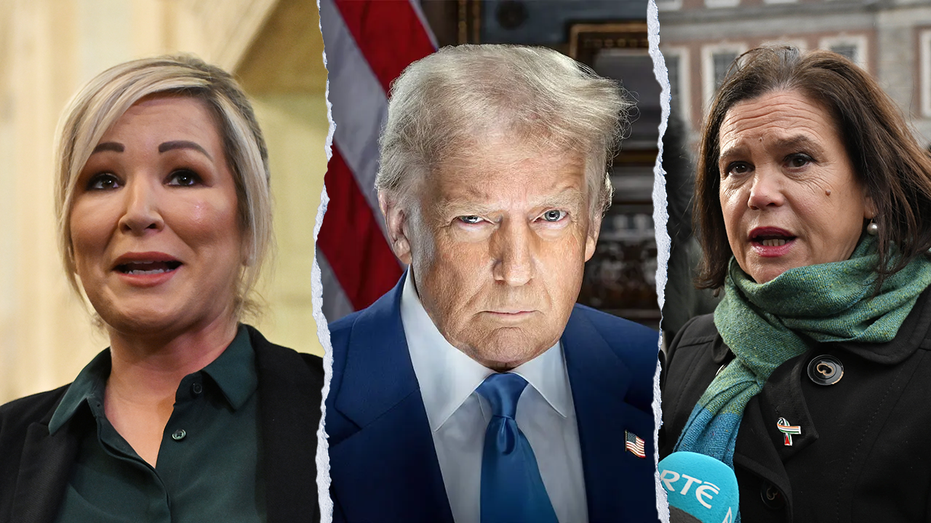Irish leaders boycott Washington St Patrick's Day events over Trump's Gaza comments
Irish leaders will skip St. Patrick’s Day celebrations in the U.S. this year to protest President Donald Trump calling for the displacement of Palestinians from Gaza.
St. Patrick’s Day celebrations are an opportunity for Irish leaders to reinforce diplomatic relations abroad, particularly in the U.S., where the annual trip to Washington, D.C., commemorates the historic and cultural ties between the countries. This year, the Irish prime minister, known as Taoiseach, Micheál Martin, will represent Ireland without Sinn Féin leader Mary Lou McDonald and Northern Ireland First Minister Michelle O'Neill.
"I followed with growing concern what's happening on the ground in Gaza and the West Bank, and like many other Irish people, have listened in horror to calls from the President of the United States for the mass expulsion of the Palestinian people from their homes and the permanent seizure of Palestinian lands," McDonald said.
"Such an approach is a fundamental breach of international law, is deeply destabilizing in the Middle East, and a dangerous departure from the U.N. position of peace and security for both Palestinians and Israelis, and the right of Palestinians to self-determination."
TRUMP’S GAZA RELOCATION PROPOSAL SPARKS HEATED DEBATE AMONG PALESTINIANS: ‘NO LIFE LEFT HERE’
While acknowledging the important opportunity to reinforce the U.S. and Ireland’s relationship, McDonald said she decided not to attend the White House events this year "as a principled stance against the call for the mass expulsion of the Palestinian people from Gaza."
O’Neill echoed McDonald’s comments, vowing to maintain diplomatic relationships with the U.S. while taking a stance against Trump’s comments.
JOURNALISTS SOUND ALARM OVER TRUMP’S 'PREPOSTEROUS' GAZA COMMENTS, WARN OF 'ETHNIC CLEANSING'
"I have taken the decision as First Minister not to attend events at the White House this year," O'Neill announced in a post. "We have all witnessed the heartbreak and devastation and the suffering in Palestine, and the recent comments by the U.S. president around the mass expulsion of the Palestinian people from Gaza is something which I cannot ignore."
O’Neill said she is standing "firmly on the side of humanity" by protesting Trump and supporting the Palestinian people.
"I will continue to engage with the U.S., both politically and economically, to better people's lives. But people rightly look to leaders to stand against injustice. And in the future, when our children and our grandchildren ask us what we did when the Palestinian people endured unimaginable suffering, I will say I stood firmly on the side of humanity."
McDonald said she supported Martin’s standing St. Patrick’s Day visit to Washington, D.C., because the prime minister would have more access and an expected audience with Trump. She urged Martin to use the "opportunity to reflect the view of the Irish people in relation to Palestine, in support of international law, and to reject threats for the mass expulsion of Palestinian people and seizures of their land."
When asked about the boycott, Martin told reporters, "Sinn Féin does what it always does – it engages in politics. I have a responsibility to the country."
Northern Ireland’s Democratic Unionist Party (DUP) called the boycott "reckless" and "short-sighted."
"The United States is a key economic partner for Northern Ireland," said DUP Leader Rt. Hon. Gavin Robinson. "Turning away from that relationship, particularly at a time when we need continued international support, is a reckless move that does nothing to advance the interests of people and businesses in Northern Ireland."
Trump said during a joint press conference with Israeli Prime Minister Benjamin Netanyahu last month that the U.S. would "take over the Gaza Strip." Trump also suggested relocating Palestinians to rebuild Gaza as the "Riviera of the Middle East." Trump’s comments sparked international backlash.
Ireland is a long-time supporter of Palestinian independence, as many Irish draw parallels with the British occupation of Ireland. Ireland has advocated for full Palestinian statehood and a two-state solution throughout the war in Gaza. Irish citizens have vocally opposed the war in Gaza and consistently protested in support of Palestinians since the war began.
Sinn Féin is an Irish Republican party with historic connections to the Irish Republican Army that has grown in popularity and power in Ireland and Northern Ireland over the past few years. Sinn Féin believes in Irish reunification by returning the British-controlled counties of Northern Ireland to Irish rule.
Just as the U.S. has played a critical role in ceasefire negotiations between Israel and Hamas, the U.S. was a key negotiator in the Good Friday Agreement between the United Kingdom and Ireland in 1998, which ended decades of conflict and brought peace to the region.
The U.S. is home to the largest Irish diaspora. The U.S. and Ireland have maintained close diplomatic relations, and traditional St. Patrick’s Day events at the White House have become an opportunity to celebrate and develop that relationship. Former President Joe Biden visited Ireland and Northern Ireland as president in 2023 to celebrate the 25th anniversary of the Good Friday Agreement.


